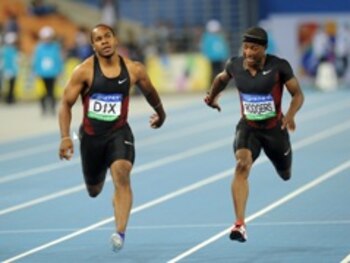
Blood Testing for All in Daegu
News that the athletics federation IAAF will conduct blood tests on all 2,000 athletes at the World Championships in Daegu has led to speculation of injuries and withdrawals.
David Oliver, a top 110m hurdler from the United States, said via Twitter , "Good, wonder how many pull outs there will be." Oliver had tweeted earlier, "Just finished a doping control at the house, I see they will blood test every athlete at Worlds, wish they didn't release that info so soon."
Olympic medalist Ato Boldon, now a track and field commentator, welcomed the news of the unprecedented anti-doping program. Via Twitter, he said, "Glad to hear it. Enough is enough."
The collection of blood samples will take place in addition to regular doping controls at the World Championships. The IAAF said that approximately 500 urine samples would be collected in and out of competition.
Blood samples will be collected mostly at a purpose-built doping control station located in the Athlete's village beginning Aug. 18. They will be analyzed by the Lausanne WADA-accredited Anti-Doping Laboratory on-site for a first hematological screening, with further analysis in Lausanne.
The lab will measure relevant parameters (biomarkers) for individual profiling purposes within the framework of the Athlete Biological Passport.
Rather than detecting prohibited substances or methods -- which urine tests do -- blood testing detects the use and effect of these substances and methods by way of abnormal variations in an athlete's biomarkers that would otherwise be stable.
The IAAF says this "will be the first time that a heterogeneous population of nearly 2,000 elite athletes competing in a major sports event will be blood tested under the same optimal conditions, within the same time period."
Opponents of blood testing cite legal and ethical issues.
Suspicious results could trigger follow-up target tests in Daeguin urine (notably for EPO) and/or further analyses for prohibited substances or prohibited methods in blood in Lausanne.
Mullings Out?
Jamaican sprinter Steve Mullings, the third-fastest man in the world this year, tested positive for a masking agent during the country's national championships according to media reports. As a result he could face a minimum ban of four years and expulsion from the sport.
Mullings was third in Jamaica's trials in the 100m behind Asafa Powell and Yohan Blake, with Usain Bolt already qualified for the Worlds as defending champion.
At the Diamond League meet in Eugene, Ore., Mullings ran 9.80 seconds, which ranks only behind Powell's 9.78 and Tyson Gay's 9.79 this year. Gay, the American record holder who trains with Mullings in Clermont, Fla., is injured and did not qualify for Daegu.
Mullings was also expected to contend in the 200m and run a leg on the 4 x 100m relay. The Jamaican team will attend a one-week camp in Gyeonasan, but Mullings will likely face a disciplinary hearing instead. He can waive the hearing if he accepts the positive result.
Senior Jamaican officials have not commented.
Mullings has already served a two-year drug suspension. He failed a drug test prior to the 2004 Olympics when higher-than-normal levels of testosterone were found in his system. A second suspension would lead to a lifetime ban.
This is the latest anti-doping blow to hit Jamaican athletics. Before the 2009 IAAF World Championships in Berlin, five Jamaican athletes tested positive for a stimulant at the national championships. The athletes were served with three-month suspensions.
World and Olympic 100m champion Shelly Ann Fraser- Pryce of Jamaica tested positive for the painkiller Oxycodone and was banned for six months, resuming her career in January.
Written by Karen Rosen.
20 years at #1 for news about the Olympics.
Últimas Noticias
Boxing’s place in the Olympics remains in peril as IOC still unhappy with the state of AIBA’s reform efforts

McLaren report to FIBA confirms abuses in the Mali women’s basketball program

ATR Extra: 1st ISF U15 World School Sport Games – Belgrade 2021

International Judo Federation bans Algerian athlete and coach for 10 years for refusing to fight an Israeli at Tokyo 2020

IIHF bans Belarus hockey president for five years for code of conduct violations - Federation Focus




